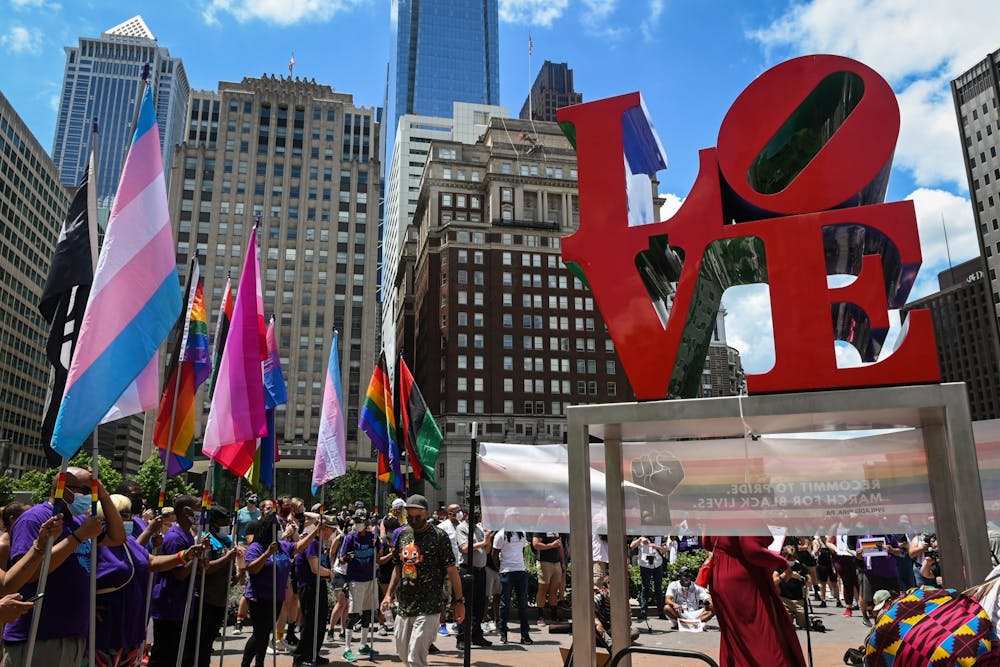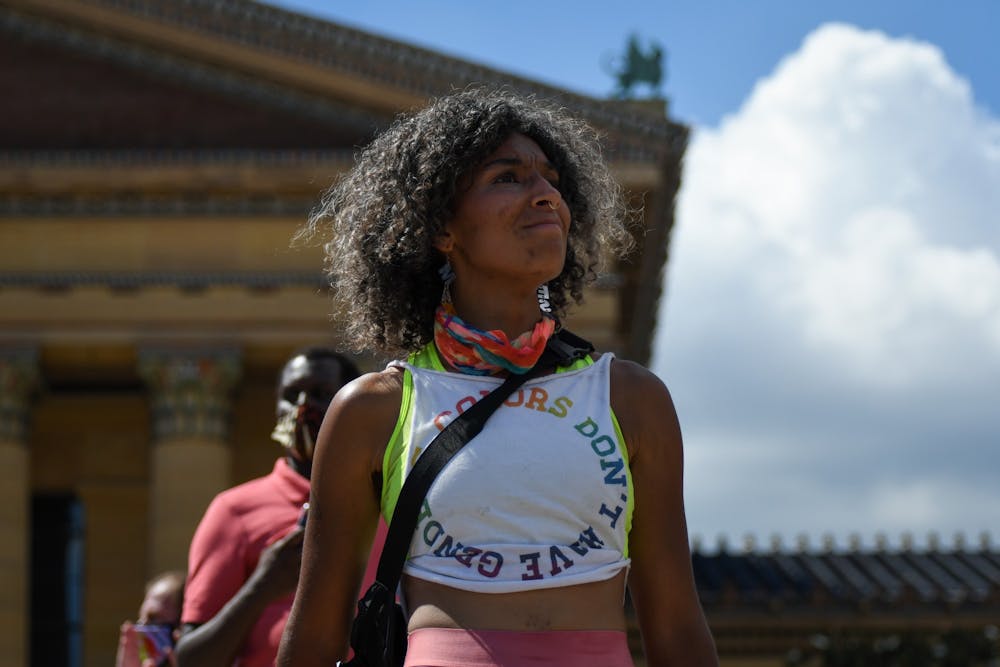
Over 500 people gathered in Philadelphia's LOVE Park on Sunday afternoon for the Philly Queer March for Black Lives — a celebration of the contributions of Black transgender women toward equality and a continuation of weeks of nationwide protests against ongoing racial injustice.
Marching in temperatures of nearly 90 degrees, the demonstration began at 1:30 p.m. at LOVE Park and lasted nearly two and a half hours.
To begin the march, David Underwood, a prominent Philadelphia Jazz musician, sang 'Lift Every Voice and Sing,' which is often referred to as 'The Black National Anthem.'
Following Underwood's performance, a series of speakers, including multiple Black transgender women, recounted personal stories on interactions with the police, emphasizing that sustained action is needed to create change within the government.
Many of the speakers said it is important to amplify the voices of Black youth and transgender people in the Black Lives Matter movement as driving forces of change in the BLM movement, and called for an increased visibility of the Black transgender community.
Drag Artist and Rapper Icon Ebony Fierce urged for the community to increase its recognition for Black trans women, whom they said are included in the Black Lives Matter movement and deserve equal representation.
"I want the government to change the system. Give more jobs and resources to Black people, especially Black trans and queer people. Give them health insurance, jobs, and housing. Give them all the basic needs that we as human beings have the right to," Fierce said.

After more than an hour of speeches, the group marched to the Philadelphia Museum of Art, chanting "Black lives, they matter here!" and "Pride was a riot! Revolution, try it!"
Many demonstrators began to dance to the beat of a drum as the crowd marched along the Benjamin Franklin Parkway, leading to the Museum.
During the march, the group paused while passing a tent encampment that has been set up since Wednesday along the Parkway to advocate for affordable and fair housing in Philadelphia and increased support for the city's homeless population. Leaders of the march stopped to offer their support for the encampment protest, which was followed by chanting of "Defund the PPD, housing for you and me" as the marchers approached the Museum.
Penn Bioethics graduate student Kees Keesling said she has been attending and photographing protests across Philadelphia frequently over the past three weeks. She said smaller marches, such as the Philly Queer March for Black Lives, are just as important as attending larger marches and posting on social media.
“The small marches are even more powerful because you’re really up close, and you’re hearing the speakers, and you’re understanding who is in your own community, and who’s making a change,” Keesling said.
While at Penn, Keesling served as a graduate associate in DuBois College House and attended a number of University programs that centered on police brutality against Black men. She said the lack of attendance from students who did not identify as people of color was disappointing, and said she hopes College Houses can collaborate to both foster community support and encourage the Penn community to attend programs at DuBois in the future.
Once at the Museum, more speakers addressed the crowd. Samantha Rise, a leader of Sunday's demonstration and Program Director of Girls Rock Philly, called for the reallocation of city funds from the Philadelphia Police Department to increase permanent housing in Philadelphia.

Samantha Rise was one of the leaders of the demonstration.
The march ended with a call-and-response recitation of a chant inspired by a quote from Assata Shakur, a leading figure in the Black Panther Party in the 1970s. "It is our duty to fight for our freedom. It is our duty to win. We must love each other and support each other. We have nothing to lose but our chains," the demonstrators chanted.
Rise told The Daily Pennsylvanian that fighting for social justice for Black trans women is of the utmost importance to them and something that must be addressed more readily in protests and by the government.
In 2019, the Human Rights Campaign reported at least 27 deaths of transgender or gender non-comforming people, the majority of whom were Black trans women. In 2015, a study at the University of California, Los Angeles reported that between 31% and 50% of trans people have experienced intimate partner violence in their lives, while the general population was reported to experience between 28% and 33%.
"We owe collective liberation, we owe civil rights, we owe all of our freedoms that we enjoy to Black women — whether its so much of the labor, community care, and support — it comes from Black women and Black trans women," Rise told the DP.
Rise said the city is not doing enough to support Black Philadelphians.
“Philadelphia is a majority Black city. The majority of Black Philadelphians are poor and we’re in crisis. And if this city is not willing to address that and do something directly to change it, that is kneeling on our necks," they said.
The Daily Pennsylvanian is an independent, student-run newspaper. Please consider making a donation to support the coverage that shapes the University. Your generosity ensures a future of strong journalism at Penn.
Donate






